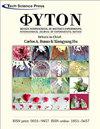利用冻干和长期贮存的甘薯花粉成功培育杂交品种的首次报道
IF 1.3
4区 生物学
Q3 PLANT SCIENCES
Phyton-international Journal of Experimental Botany
Pub Date : 2023-01-01
DOI:10.32604/phyton.2023.042397
引用次数: 1
摘要
各种生物限制,包括雄性和雌性植物之间开花不稳定和不同步,阻碍了杂交的成功发育和遗传增益。因此,花粉储存在人工授粉和增加遗传增益方面受到广泛关注。这项为期4年的研究旨在开发一种实用的长期花粉储存技术,以成功培育山药杂交品种。采集两株薯蓣雄蜂的新鲜花粉,进行冻干(两次冻干处理),室温(24°C - 25°C)保存12个月。此外,还通过与4个雌性品种杂交,对冻干后储存的花粉进行了活力测定。我们的研究结果表明,冷冻干燥对保存12个月后的活花粉是有效的。处理1(干燥48 h)的花粉发芽率和育粉率高于处理2(干燥72 h)。虽然我们观察到冷冻花粉在储存12个月后存活率下降,但我们产生的杂交幼苗的成功率为12%至21%,而使用新鲜花粉的成功率为21%至31%。基于分子基因分型的亲子鉴定证实了获得的幼苗的杂交状态,在温室中生长良好。冻干法是一种长期保存大量山药花粉样品的实用方法。该议定书将对山药育种计划产生积极影响,特别是在发展中国家。本文章由计算机程序翻译,如有差异,请以英文原文为准。
First Report of a Successful Development of Yam Hybrids (Dioscorea alata L.) from Lyophilized and Long-Term Stored Pollens
Various biological constraints including erratic and asynchronous flowering between male and female plants hinder successful hybrid development and genetic gains in greater yam breeding programs. Therefore, pollen storage has gained much attention to facilitate artificial pollinations and increase the genetic gains. This 4-year study aimed at developing a practical long-term pollen storage technique for the successful development of yam hybrids. Fresh pollens were collected from two Dioscorea alata males, then lyophilized (two lyophilization treatments were applied), followed by storage at room temperature (24°C–25°C) for 12 months. Moreover, the lyophilized and stored pollens were tested for viability by crossing with four female varieties. Our results showed that lyophilization is effective for achieving viable pollens after 12 months of storage. Treatment 1 (48 h drying) showed higher pollen germination and fertility rates than Treatment 2 (72 h drying). Although we observed a reduction in viability of lyophilized pollens after 12 months of storage, we generated hybrid seedlings with success rates from 12% to 21% compared to 21%–31% when using fresh pollens. Paternity testing based on molecular genotyping confirmed the hybrid status of the obtained seedlings, which grew well in a greenhouse. Lyophilization is a practical approach for a long-term storage of greater yam pollen samples. This protocol will positively impact yam breeding programs particularly in developing countries.
求助全文
通过发布文献求助,成功后即可免费获取论文全文。
去求助
来源期刊
CiteScore
1.90
自引率
11.80%
发文量
17
审稿时长
12 months
期刊介绍:
Phyton-International Journal of Experimental Botany is an international journal that publishes on the broadest aspects of plant biology and ecology. The journal welcomes the original and exciting submissions that provide new and fundamental insights into the origins, development, and function of plants from the molecular to the whole organism and its interactions within the biotic and abiotic environment. Phyton-International Journal of Experimental Botany publishes outstanding research in the plant and ecology sciences, especially in the areas of plant physiology and biochemistry, plant metabolism, plant ecology and evolution, as well as those making use of synthetic, modeling, bioinformatics, and -omics tools. Manuscripts submitted to this journal must not be under simultaneous consideration or have been published elsewhere, either in part or in whole.

 求助内容:
求助内容: 应助结果提醒方式:
应助结果提醒方式:


